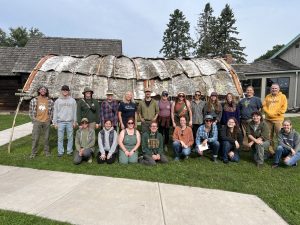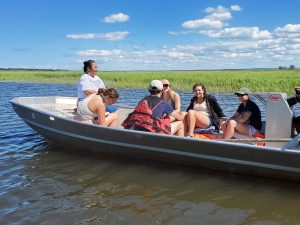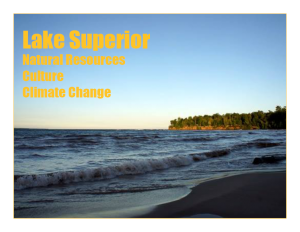These multi-day field courses for organized groups of high school, college, and adult learners provide experiential learning that integrates traditional ecological knowledge of the Lake Superior Ojibwe people, place-based investigations, and leadership development that will challenge you to take action in your community and culture! Contact cathy.techtmann@wisc.edu for more information or to build your group’s field course.
2025 Field Courses
UW Stevens Point Lake Superior Culture and Ecology Field Course, Sept. 10-14

UW Stevens Point College of Natural Resources majors learn about Ojibwe lifeways at Flicker House on Madeline Island.
This annual 5-day field course integrates traditional ecological knowledge (TEK)of the Lake Superior Ojibwe and place-based observation, with “western” science to examine climate change impacts and adaptation strategies. This course takes a watershed scale approach with field experiences from Madeline Island to Iron County’s Saxon Harbor. This year’s field course co-directors are Drs. Holly Petritto, Kendra Lindicoat, and Chris Yahnke from UW Stevens Point and Cathy Techtmann-UW Extension Environmental Outreach Specialist. Partners include the Great Lakes Indian Fish and Wildlife Commission, UWSP Northern Aquaculture Demonstration Center, Madeline Island Museum, Native American Educational Technologies, and Bad River Tribe of the Lake Superior Ojibwe, the Superior Rivers Watershed Association, and Iron County, WI. 2025 UWSP Field Course Agenda
2024 Field Courses

Students experience the importance of manoomin (wild rice) during a trip to the Bad River Tribe’s Kakagon Slough.
Carroll University “Ojibwe Culture and Ecology” Field Course, July 19-27
This experiential 8-day field course explores historic and contemporary Ojibwe cultural andecological relationships. Course experiences are taught by tribal and UW Extension specialists and includes cultural learning experiences within the Bad River and Red Cliff Tribal Nations, , at the Sandy Lake Memorial in Minnesota, the Voigt Task Force Meeting, within Wisconsin’s Lake Superior tribal communities. This course is offered in partnership with UW-Extension, the Great Lakes Indian Fish and Wildlife Commission, and Bad River and Red Cliff Tribes of the Lake Superior Ojibwe. Field course co-directors: Dr. Aaron Routhe-Carroll University and Cathy Techtmann-UW Extension. 2024-Carroll U Ojibwe Culture and Ecology Field Course
 University of Wisconsin Stevens Point “Lake Superior Natural Resources, Culture, and Climate Change” field course, October 3-6.
University of Wisconsin Stevens Point “Lake Superior Natural Resources, Culture, and Climate Change” field course, October 3-6.
This annual 5-day field course integrates traditional ecological knowledge (TEK) of the Lake Superior Ojibwe and place-based observation, with “western” science to examine climate change impacts and adaptation strategies. This course takes a watershed scale approach with field experiences from Madeline Island to Iron County’s Saxon Harbor. This year’s field course co-directors are Drs. Holly Petritto, Kendra Lindicoat, and Chris Yahnke from UW Stevens Point and Cathy Techtmann-UW Extension Environmental Outreach Specialist. Partners include the Great Lakes Indian Fish and Wildlife Commission, UWSP Northern Aquaculture Demonstration Center, Madeline Island Museum, Native American Educational Technologies, and Bad River Tribe of the Lake Superior Ojibwe, the Superior Rivers Watershed Association, and Iron County, WI. 2024 UWSP Field Course
Archive of Our Changing Climate, Changing Culture Institutes
Browse the 2012-2023 Changing Climate, Changing Culture Field Course Archives to see what we learned at past institutes and field courses.